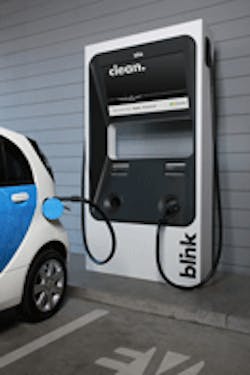National recharging network for EVs takes shape
An effort to create a nationwide network of recharging sites for electric vehicles at BP and Arco-based filling stations is being readied for next year, with 45 re-charging locations across the U.S. expected to be activated by March 2011.
ECOtality and BP Products North America Inc. are collaborating on this effort as part of “The EV Project” started last year with a sizable grant from the U.S. Dept. of Energy (DOE). It aims to install approximately 15,000 charging stations in 16 cities and major metropolitan areas in six states, while helping place 8,300 EVs on the road.
The project is funded with a $114.8 million DOE grant by way of the American Recovery and Reinvestment Act (ARRA) or “stimulus bill” passed during the first few months of the Obama administration. The grants are matched by private investment, bringing the total value of the project to approximately $230 million, noted Don Karner, president of ECOtality North America.
“One of [the project’s] goals is to break the common misconceptions with EVs, and our fast chargers will solve two of the major EV myths,” he added. “The project will make sure that there are readily available public chargers nationwide, and that drivers can charge their cars quickly and easily at locations convenient to them. By removing these barriers to adoption and creating rich charging infrastructure, we will drive consumer EV implementation.”
However, the impetus to establish such a national network may not be necessary to spur EV demand – and may in some ways work against the effort to shift EV recharging to night-time hours, when electricity demand is lower, according to Sam Jaffe, research manager for consulting firm IDC Energy Insights.
“Having a network of EV recharging locations may make some difference in the willingness and comfort levels of consumers to buy EVs,” he told Fleet Owner. “But these vehicles are really designed to be recharged at night, at homes and fleet garages.”
In some respects, a recharging network that mirrors the existing refilling station network for gasoline and diesel powered vehicles would be a disadvantage, Jaffe explained, “especially if we’re talking ‘fast charging’ systems that recharge an entire vehicle battery pack in half an hour.” That process, he cautioned, requires 150 amps of electricity. “That kind of electrical draw would force changes to how electricity is distributed and could cause a lot of repercussions to the electrical distribution systems we have now.”
And it’s precisely this kind of technology BP will be testing and evaluating: new “Blink DC Fast Chargers” developed by ECOtality at 45 different filling stations in key transportation corridors and population-dense locales.
BP added that it expects to install these DC Fast Chargers in major pilot markets such as: Phoenix and Tucson in Arizona; San Diego and Los Angeles in California; Portland, Eugene, Salem, and Corvallis in Oregon; Seattle, WA; and Nashville, Knoxville and Chattanooga in Tennessee.
About the Author
Sean Kilcarr
Editor in Chief
Sean Kilcarr is a former longtime FleetOwner senior editor who wrote for the publication from 2000 to 2018. He served as editor-in-chief from 2017 to 2018.
